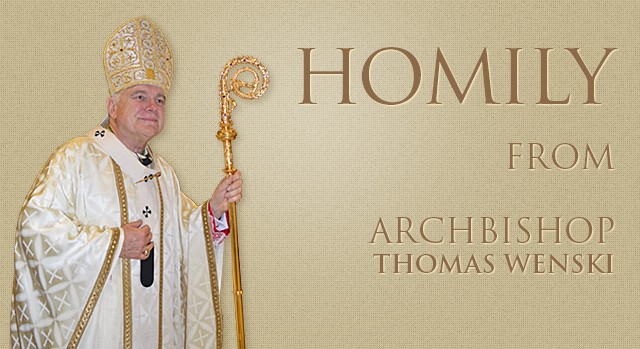By Archbishop Thomas Wenski - The Archdiocese of Miami
Archbishop Thomas Wenski preached this homily at the closing Mass for Black Catholic History Month, celebrated the evening of Nov. 29, 2015 at St. Anthony Church, Fort Lauderdale.
This first Sunday of Advent reminds us that Jesus is coming again. Now whether that’s “good news” to you or not, depends on whether his first coming was “good news” to you.
Today, the Black Catholic community of the Archdiocese concludes its month long celebration of Black Catholic History Month. Because it is made by human beings, that is to say by flawed creatures wounded by sin, history is as full of shadows as much as it is of lights. Yet, as Christians, during this Season of Advent, we prepare to celebrate the past, future and present coming of Him whom the darkness could not overcome.
And, because of Him, the Church (and when I say “Church” I’m talking about you), because of Jesus and his Advent (that is, his coming among us), we can look back to the past with gratitude, celebrate the present with enthusiasm and look forward to the future with confidence.
Fifty years ago, the bishops at the Second Vatican Council said it like this: “(T)he Church, ‘like a stranger in a foreign land, presses forward amid the persecutions of the world and the consolations of God, announcing the cross and death of the Lord until He comes.’ By the power of the risen Lord she is given strength that she might, in patience and in love, overcome her sorrows and her challenges, both within herself and from without, and that she might reveal to the world, faithfully though darkly, the mystery of her Lord until, in the end, it will be manifested in full light.” (Lumen Gentium)
And we do have sorrows and challenges — everybody does, for such is the nature of our exile in this valley of tears. All of us could recite a depressing litany of issues that especially impact the African American community: racism, classism, unemployment, teen pregnancies, drug abuse, violence, gang activity, AIDS, poor education in our public schools. Yet, like a stranger in a foreign land, the Church (and remember, Church, that’s you), the Church presses forward “amid the persecutions of the world and the consolations of God.”
In celebrating Black Catholic History month, we celebrate those “consolations of God” that have never been lacking — even amid the persecutions of the world — in the Black Catholic experience. And one of those consolations is the vitality and growth of the Catholic Church in Africa. I hope you have been able to follow if even for a few minutes the coverage of Pope Francis’ visit to Kenya, Uganda and the Central African Republic these days.
In Western Europe, the Church seems old and tired — and people think of the Gospel as “old news.” But in Africa, the Church is young and vibrant that proclaims the Gospel as “good news” with a prophetic voice. Even here in the Archdiocese of Miami, there has been great growth in the numbers of Catholics among peoples of color as migration has brought to South Florida Africans and other blacks from the African diaspora — Haitians, West Indians, Brazilians, and blacks from Spanish speaking cultures. This diversity enriches the Church. In the words of that old spiritual, “In Christ, there is no east or west, no north or south, no black or white.” Diversity never divides the Church — only sin can do that. By the power of the Risen Lord, we are given the strength to overcome sorrow and challenges from whatever source.
Advent calls us to some introspection. It poses to us the question, “What are we looking for?” “Where do we put our priorities?” “What is the good news we want to hear?” And is it really good news for us? Advent reminds us: “The Lord is coming” and thus calls us to renew our hope, faith and courage; Advent calls us to a continued struggle for justice; it calls us to find in the Word who becomes our own flesh healing and wholeness.
Advent is not about a judgmental God trying to scare us into heaven; rather it is about a merciful God inviting us to see what he is offering us.
Let’s remember one thing, the Bible was written by people who were oppressed. Of course, the Bible is God’s word, but that word was communicated to us through human authors who in spite of their being oppressed, in spite of their being persecuted, communicated to us that in this world of sin, of division, of war, God will have the final say. Now, doesn’t that sound like “good news” to you?
Well, like I said, at the beginning of my homily — that depends. But, we won’t have any need to fear the Lord when he comes again in glory, if we didn’t hesitate to accept him when he came the first time, in humility, as a little child in the poverty of Bethlehem.

